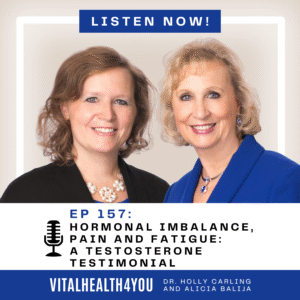There is nothing more distressing than insomnia. Sleep deprivation has many long-term negative impacts on our health and wellbeing, from a weakened immune system to depression and mood disorders, to an inability to concentrate and memory loss. Sleep disorders are also extremely common, affecting up to fifty percent of the U.S. adult population.
While sleep medications can offer a temporary reprieve they carry risks of side effects, and when taken long-term, they often result in physical dependence and/or addiction. In certain susceptible individuals, dependence on benzodiazepines and Z-drugs for example can take place rapidly and can be extremely difficult to wean off.
Can stubborn sleep issues be fixed without medication? The answer is not only yes, but by fixing the underlying causes, your overall health will significantly improve! Four of the most common causes of sleep disorders include: chronic stress, hypoglycemia (low blood sugar), sleep apnea, and hormonal changes.
An “epidemic” in our society, chronic stress induces frequent spikes of the “fight or flight” hormone cortisol, a stimulating hormone that also regulates our circadian rhythm. Stress leads to an excess accumulation of cortisol at night, causing frequent waking. Many people with elevated nighttime cortisol will additionally have low levels of cortisol in the morning, leaving them groggy and unrefreshed; they often report feeling best towards evening.
Both hypoglycemia (low blood sugar) and sleep apnea are types of physical stress that also trigger cortisol release and frequent nighttime waking. Hypoglycemia is a genetically driven condition requiring frequent meals through the day, prompted by low blood sugar symptoms including irritability or feeling weak or dizzy.
Sleep apnea is a serious sleep disorder in which breathing repeatedly stops and starts, causing sometimes dangerous drops in oxygen throughout the night. (Snoring and nighttime urination are major symptoms of sleep apnea.) An estimated eighteen million Americans suffer from this condition; left untreated it can cause or contribute to cardiopathies, cancer, stroke, erectile dysfunction and dementia or cognitive decline.
Finally, low hormone levels, especially progesterone typical during perimenopause and menopause, commonly cause mild to severe insomnia. While many doctors will provide oral progesterone, long-term use can cause dependency. The goal should be to support the body regaining healthy sleep patterns on its own.
Insomnia can be complex to treat, but the many health benefits are worth the effort. At Vital Health we combine a careful health history with functional nutritional testing to figure out what is causing your sleep problems. We then combine acupuncture, nutrition, and targeted supplements and herbs to get you well!
Learn more by attending our upcoming health class, The 7 Secrets to Getting a Good Night’s Sleep Naturally, Wednesday, September 20th 7:30pm at Vital Health in CDA. Fee: $15. Attend in-person or online via Zoom. To register, call 208-765-1994 or go to vitalhealthcda.com/health-classes/
Want to hear more from Vital Health? Check out our podcast. Search for VitalHealth4You on your favorite podcast listening app or go to vitalhealthcda.com/podcasts/
©2023 Darcy Greenwald, M.S.O.M., L.Ac. and Vital Health







